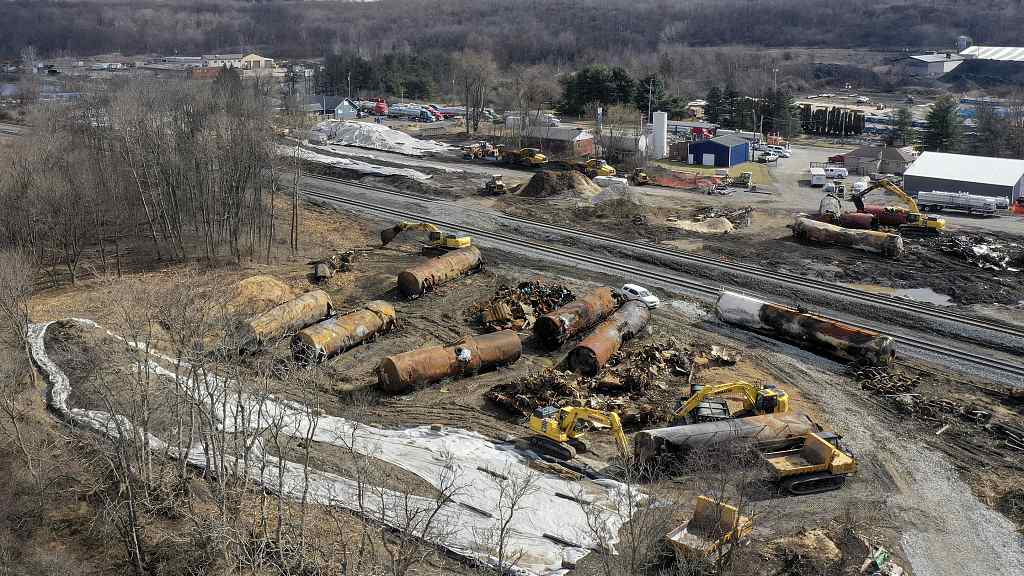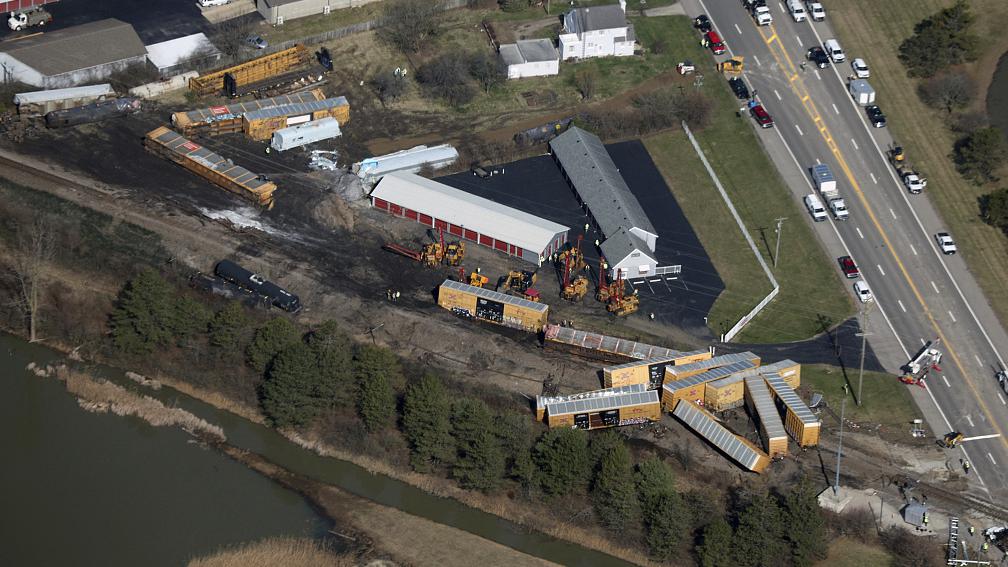
Cleanup work underway at the site of a Norfolk Southern freight train derailment happened on February 3 in East Palestine, Ohio, February 24, 2023. /CFP
Cleanup work underway at the site of a Norfolk Southern freight train derailment happened on February 3 in East Palestine, Ohio, February 24, 2023. /CFP
While questions around the catastrophic Ohio train derailment on February 3 are pending, a second Norfolk Southern train was reported to have derailed in Ohio on Saturday.
This time, no one was injured and no hazardous materials were involved when 28 cars of the 212-car train derailed while traveling south through Springfield, according to the rail company Norfolk Southern, which also operated the train that derailed on February 3.

A Norfolk Southern Train derailed in Springfield, Ohio, March 4, 2023. /CFP
A Norfolk Southern Train derailed in Springfield, Ohio, March 4, 2023. /CFP
This was the fourth Norfolk Southern derailment in Ohio in five months.
"Sandusky, Steubenville, East Palestine, and now Springfield – four Norfolk Southern derailments in less than five months because this corporation has been more concerned with its profit margin than with Ohioans' safety," said U.S. Senator Sherrod Brown, a Democrat from Ohio, in a statement. "Ohio communities should not be forced to live in fear of another disaster."
More derailments can be traced outside Ohio. In Van Buren Township, Michigan, a Norfolk Southern train was reported to have derailed on February 16, and another Norfolk Southern train derailment was reported on February 25 in Lexington, North Carolina. Data from the U.S. Federal Railroad Administration (FRA) showed that about 1,000 derailments take place each year since 2019.
Disputed electronic brakes
Preliminary investigation by the National Transportation Safety Board (NTSB) imputed blame to a brake failure for the February 3 derailment, which revived the debate over the adoption of electronic brakes.
Compared to the conventional air brakes that require each car to brake individually, the electronically controlled pneumatic (ECP) brake systems "simultaneously send an electronic braking command to all equipped cars in the train, reducing the time before a car's pneumatic brakes are engaged," said the Pipeline and Hazardous Materials Safety Administration (PHMSA), which works within the U.S. Department of Transportation.
"The simultaneous application of ECP brakes on all cars in a train also significantly improves train handling by substantially reducing stopping distances as well as buff and draft forces within the train, which under certain conditions can result in a derailment," it added.
The PHMSA and the FRA issued a safety rule in 2015, requiring ECP brake systems installed in all the trains that are designated "high-hazard flammable unit train" by 2023.
However, the brake mandate was repealed three years later by the Trump administration, after a cost-benefit analysis saying it's not cost-effective.
"One of the biggest drawbacks of ECP brakes is that all the railcars on a train must have them or the system doesn't work, making it impossible to phase in gradually," reported Bloomberg.
After the devastating derailment, Transportation Secretary Pete Buttigieg urged safety changes in the nation's freight railroads, and announced a package of reforms.
In his letter to Norfolk Southern Chief Executive Officer Alan Shaw, Buttigieg pushed the company to support updated safety measures.
"Major derailments in the past have been followed by calls for reform – and by vigorous resistance by your industry to increased safety measures. This must change," Buttigieg wrote.
However, even the implementation of the ECP braking rule would not prevent the derailment, NTSB Chair Jennifer Homendy pointed out.
"The ECP braking rule would've applied ONLY to HIGH HAZARD FLAMMABLE TRAINS. The train that derailed in East Palestine was a MIXED FREIGHT TRAIN containing only 3 placarded Class 3 flammable liquids cars," she tweeted. "This means even if the rule had gone into effect, this train wouldn't have had ECP brakes."
Longer trains yet fewer workforces
The derailment also pointed to a much-criticized system called Precision Scheduled Railroading (PSR), which is widely welcomed by rail carriers.
"Six of the seven largest U.S. freight railroads," including Norfolk Southern, have reported implementing the system, said the U.S. Government Accountability Office (GAO).
By adopting PSR, trains are generally longer, overseen by fewer workers, and run on fixed schedules which leaves little or no time to conduct inspections.
A report released by GAO in December showed that in 2022, all the seven U.S. freight railroads ran longer trains.
"The overall number of staff among the seven largest freight railroads decreased by about 28 percent from 2011 through 2021. Further, all seven railroads said they have increased the length of trains in recent years," the report read.
The 2.8-kilometer-long derailed Norfolk Southern train, consisting of three locomotives and 150 freight cars, was reported to have only a crew of two rail workers plus one trainee to monitor.
"In fact, derailments per train mile and incidents at rail yards have significantly increased on several major freight railroads since they adopted the Precision Scheduled Railraoding," said Greg Regan, president of the Transportation Trades Department for the AFL-CIO.
"Inspections have been rushed," Matt Weaver, a member from the Brotherhood of Maintenance of Way Employees, told China Media Group. "Two guys working four to five minutes per car, inspected the car for departure. Now it's one guy, 90 seconds or less."